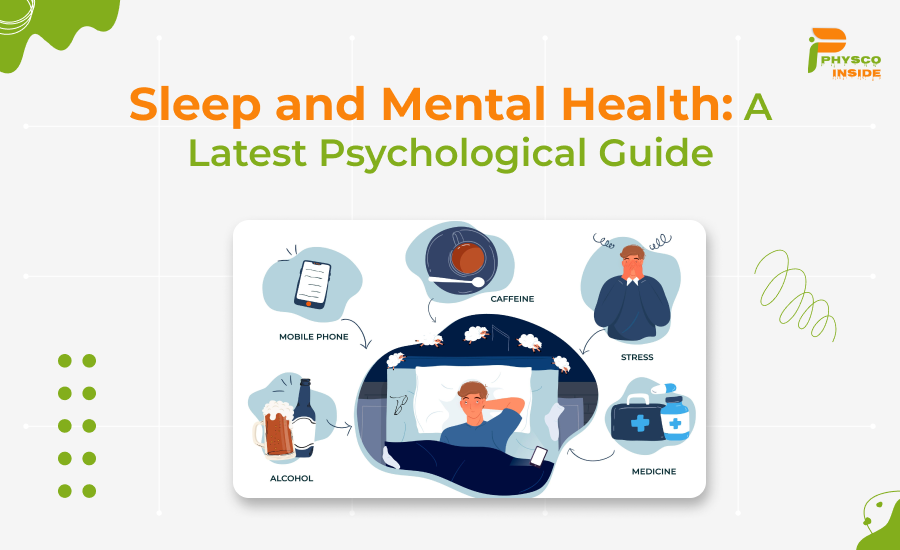1) Introduction:
Sleep is a major Backbone of overall health, Impacting everything from Mental Capability to Emotional Stability. As we explore the details of Present-day life, Sleep Disorders have become Progressively common, altogether Influencing our Mental Health. Addressing Sleep Disorders is critical for actual Health and keeping up with ideal Mental health.
Area of Focus: In this complete guide, we will investigate the Many-sided connection between Sleep and Mental health, including the mental impacts of lack of sleep, the Significance of Sleep for Mental Well-being, and Captivating medicines for conditions like Insomnia and Sleep anxiety. We will dive into what Sleep means for clear Mental Well-being Disorders like Depression, Bipolar Disorder, and Schizophrenia. Furthermore, reasonable tips and systems to further develop Sleep quality will be given, Assisting you with Achieving better mental and emotional balance. Whether you battle with Insomnia or sleep anxiety, or Essentially need to upgrade your Sleep hygiene, this guide offers significant bits of knowledge and answers for work on your Sleep and, eventually, your Mental Well-being.

2) What is the Importance of Sleep for Mental Health?
2.1) How Sleep Impacts Mental Health?
Sleep is a Fundamental pillar of Mental health. During Sleep, the Cerebrum Processes feelings unites Recollections, and removes toxins. A lack of quality sleep upsets these Essential Capabilities, Prompting emotional Instability, Hindered Mental Capabilities, and Expanded feelings of anxiety. Chronic sleep deprivation can worsen Existing mental health conditions, for example, anxiety and Depression, making it harder to oversee Day-to-Day Stressors.
2.2) Benefits of Adequate Sleep on Mental Health
Getting Adequate, quality Sleep can have significant advantages on mental health. Adequate Sleep Upgrades state of mind, hones Fixation, and lifts overall emotional strength. It manages Hormones that control pressure and feelings, Decreasing the Probability of Mental health Disorders. Well-rested individuals tend to experience fewer mood swings and better Interpersonal relationships. By Focusing on Sleep, you can Fundamentally work on your personal satisfaction and mental health.
Incorporating great Sleep hygiene rehearses, for example, keeping a normal Sleep schedule and Establishing a Relaxing climate, can assist with Guaranteeing you receive the Mental Well-being rewards of a decent night’s Sleep. By understanding the basic job Sleep plays in mental health, you can find positive ways to work on both your Sleep and general health.
3) Common Sleep Disorders and Their Psychological Impact
3.1) Overview of Sleep Disorders
Sleep Disorders influence a large number of individuals around the world, Essentially Affecting their personal Satisfaction and mental health. The most well-known Sleep Disorders Incorporate Insomnia, where people battle to fall or stay asleep; Sleep apnea, Portrayed by Interrupted breathing during Sleep; and Restless leg Syndrome, creating awkward uproars in the legs. Understanding these Disorders is the most vital phase in Addressing their mental effect.
3.2) Psychological Effects of Sleep Deprivation
Sleep Deprivation has significant mental impacts. It can prompt Increased Irritability, Anxiety, and Depression. Mental Capabilities like Memory, Consideration, and independent direction are additionally Impaired, making everyday errands seriously testing. Chronic sleep deprivation can Intensify Existing mental health conditions, making an endless loop of poor Sleep and Weakening mental health.
3.3) Discussion on Sleep Disorders Psychology
The Psychology of Sleep Disorders dives into the Confusing exchange between Sleep and Mental Well-being. Mental factors like pressure, anxiety, and Depression can add to Sleep issues, while Lack of Sleep can Deteriorate these circumstances. Effective treatment Frequently requires an All-encompassing Methodology, Addressing both the mental and Physiological parts of Sleep Disorders. Treatments like Cognitive Behavioral Therapy for Insomnia (CBT-I) and Lifestyle Alterations can Essentially further develop Sleep quality and general mental health.
Understanding normal Sleep Disorders and their mental effect is critical for Advancing better Sleep Health and Upgrading mental health. Focusing on Sleep and looking for Proficient assistance for steady Sleep Disorders can prompt a better, more healthy Lifestyle.
4) Sleep and Specific Mental Health Conditions
4.1) Depression and Sleep
4.1.1) Effects of Lack of Sleep on Mental Health
Lack of Sleep can altogether demolish Mental well-being, adding to Expanded Sensations of anxiety and Depression. Over the long haul, chronic sleep deprivation can disable Mental Capability and emotional Dependability.
4.1.2) Depression and Lack of Sleep
Depression and Lack of Sleep are firmly connected. Insomnia can be both a side effect and a reason for depression, making an endless loop that is difficult to break.
4.1.3) Sleeping All Day Depression
In contrast, a few people with depression might wind up Sleeping unreasonably. This can be a type of break from their sentiments however frequently a Lack of energy and expanded laziness prompts.
4.1.4) Depressed and Can’t Sleep
Many individuals with depression battle with nodding off or staying asleep. This sleeping disorder can compound burdensome symptoms, making recuperation seriously tested.
4.1.5) Not Sleeping Depression
Chronic sleep deprivation because of depression can prompt extreme emotional episodes, irritability, and a further decrease in Mental well-being. Addressing Sleep disorders is essential in managing depression.
4.2) Bipolar Disorder and Sleep
4.2.1) Treating Insomnia in Bipolar Disorder
Insomnia is a typical issue in bipolar Disorder. Effective therapy frequently incorporates medication, Cognitive-Behavioral Therapy for Insomnia (CBT-I), and keeping a predictable Sleep schedule.
4.2.2) Bipolar Depression Insomnia
During burdensome episodes, those with bipolar disorder frequently experience Insomnia, demolishing their general condition. Appropriate administration of Sleep is fundamental for soundness.
4.2.3) Bipolar Disorder and Sleep
Normal Sleep examples can assist with controlling emotional episodes in bipolar Disorder, lessening the repetition and seriousness of hyper and burdensome episodes.
4.3) Schizophrenia and Sleep
4.3.1) Schizophrenia and Sleep Issues
Individuals with schizophrenia oftentimes experience Sleep irritations, including a sleeping disorder and irregular Sleep cycles. These issues can compound symptoms and weaken everyday working.
4.3.2) Impact of Sleep on Schizophrenia Symptoms
Further developing Sleep quality can altogether decrease the seriousness of schizophrenia symptoms. Appropriate Sleep hygiene and clinical meditation can assist with dealing with these Sleep-related issues.

5) Sleep Anxiety and Therapy
5.1) Understanding Sleep Anxiety
Sleep anxiety is a typical issue where the stress over not having the option to Sleep turns into an unavoidable outcome. This anxiety can prompt trouble falling or staying asleep, further compounding Mental health issues.
5.2) Effective Therapies for Sleep Anxiety
Powerful therapies for Sleep anxiety incorporate Cognitive-Behavioral Therapy for Insomnia (CBT-I), which assists change with negative thought designs about Sleep. Relaxation techniques like Deep breathing, progressive muscle relaxation, and care reflection can likewise lessen anxiety. Laying out a reliable Sleep routine and establishing a quieting pre-sleep climate are down-to-earth moves toward easing Sleep anxiety.
6) What is Insomnia?
6.1) Mental Health Insomnia
Mental health insomnia is a typical issue influencing millions. It can result from anxiety, depression, or stress, prompting hardships in nodding off or staying asleep. A sleeping disorder worsens Mental health issues, making an endless loop that can be difficult to break.
6.2) Practical Strategies for Overcoming Insomnia
To battle Insomnia, Establish a steady Sleep schedule. Keep away from caffeine and hardware before sleep time. Practice relaxation techniques like Deep breathing, meditation, or moderate muscle relaxing. Making a quiet sleep time routine and guaranteeing an agreeable Sleep climate can likewise further develop Sleep quality. If Insomnia continues, looking for proficient assistance from a specialist or specialist is suggested.
7) What are the Effects of Sleep Deprivation?
7.1) Lack of Sleep Mental Health Consequences
Sleep deprivation can altogether influence mental health. Chronic Lack of Sleep can prompt extreme circumstances like anxiety, depression, and elevated feelings of anxiety. People might encounter mindset swings, irritability, and a diminished capacity to adapt to ordinary stressors.
7.2) Psychological Effects of Sleep Deprivation
The mental impacts of sleep deprivation are significant. It can obstruct mental capabilities, prompting hardships in focus, memory maintenance, and navigation. Deep guideline becomes testing, expanding the gamble of Mental health issues.
7.3) Long-term Impact on Cognitive Functions and Emotional Regulation
Drawn-out sleep deprivation can make long haul harm mental capabilities and emotional guidelines. Persistent Sleep disorders can add to the advancement of constant mental health conditions, further emphasizing the basic requirement for focusing on Sleep for generally speaking health.
8) What are Practical Tips for Better Sleep?
- Sleep Hygiene Practices Establish a consistent sleep schedule by going to bed and waking up at the same time every day, even on weekends. Establish a soothing climate by keeping your room cool, dull, and calm. Limit openness to screens and splendid lights an hour before sleep time to energize the development of melatonin.
- Lifestyle Changes to Improve Sleep Quality Integrate normal active work into your everyday daily schedule, however, stay away from devastating activity near sleep time. Keep away from caffeine and weighty dinners at night. Engage in relaxing activities such as reading, taking a warm bath, or practicing meditation before bed.
- When to Seek Professional Help for Sleep Issues Assuming you keep on encountering Sleep disorders despite making lifestyle transforms, it could be an ideal opportunity to look for proficient assistance. Counsel a medical services supplier on the off chance that you have symptoms of a sleeping disorder, Sleep apnea, or other Sleep disorders. They can give a genuine conclusion and suggest medicines like Cognitive Behavioral Therapy for Insomnia (CBT-I) or medication. Focusing on Sleep is fundamental for keeping up with great Mental well-being.

9) Conclusion
In a nutshell, this guide has featured a pivotal focus on Sleep and mental health. We’ve investigated what Sleep means for conditions like depression, bipolar disorder, and schizophrenia, emphasizing its job in mental capability and emotional health. Focusing on quality Sleep is fundamental; it improves temperament, lessens pressure, and supports general Mental health flexibility. Assuming that you’re encountering diligent Sleep disorders — whether Insomnia, Sleep Anxiety, or irregular sleep patterns — it is vital to look for proficient assistance. Try not to underrate the extraordinary force of Addressing Sleep issues; it can prompt huge upgrades in your day-to-day existence and Mental well-being. Begin focusing on Sleep today for a better tomorrow.
10) FAQs
A: Lack of Sleep can prompt expanded anxiety, depression, and mental hindrances. Chronic sleep deprivation can intensify existing Mental health conditions and adversely influence emotional guidelines and navigation.
A: Cognitive-behavioral therapy for Insomnia (CBT-I) is deeply successful. Relaxing strategies, care reflection, and making a reliable Sleep routine can likewise assist with easing Sleep anxiety.
A: Indeed, keeping a customary Sleep timetable can assist with settling emotional episodes and decrease the seriousness of symptoms in people with bipolar disorder. Sleep hygiene and medication management are vital parts of treatment.
A: Laying out a reliable Sleep schedule, keeping away from caffeine and gadgets before sleep time, and rehearsing relaxation procedures can help. At times, prescription or treatment might be important to address basic depression.
A: Schizophrenia can upset typical Sleep designs, prompting a sleeping disorder, irregular Sleep-wake cycles, and other Sleep unsettling influences. Managing Sleep disorders is a significant part of treatment for people with schizophrenia.


